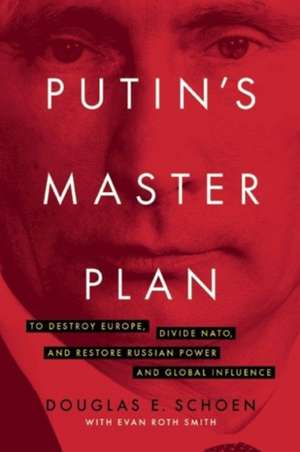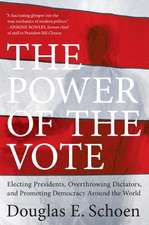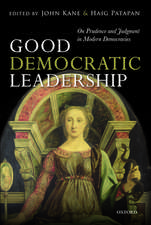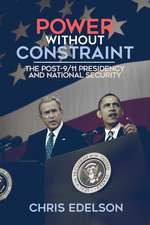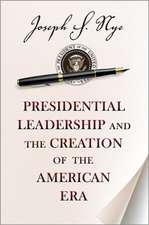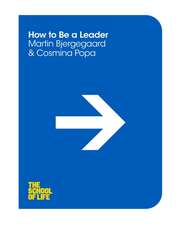Putin's Master Plan: To Destroy Europe, Divide NATO, and Restore Russian Power and Global Influence
Autor Douglas E. Schoen Cu Evan Roth Smithen Limba Engleză Hardback – 27 sep 2016
Vladimir Putin has a master plan to destroy Europe, divide NATO, reclaim Russian influence in the world, and most of all to marginalize the United States and the West in order to achieve regional hegemony and global power. Putin’s unified strategy and vision for Europe has not been thoroughly discussed or articulated in any meaningful way until now. Putin’s Master Plan is the first comprehensive attempt to systematically explain Putin’s global strategy, which could inevitably and inexorably lead to the breakup of the NATO alliance, and potentially to war with the West. Currently, the West has no strategy, no plan, and no tactics to confront Putin’s master plan other than imposing limited economic sanctions, which have done little to deter Putin's aggression—and may well have encouraged and facilitated it. The viewpoint taken here is not just alarmism, but an accurate and, for the first time, clear and sober portrayal of a frightening situation that, more and more, serious observers of European and Russian politics are openly recognizing and acknowledging.
Putin’s Master Plan makes the case that it is essential to wake up to Putin’s strategy to destroy Europe, divide NATO, and build a new empire in the former Soviet Union. Russia has demonstrated an extraordinary level of aggression, most boldly in its outright invasions of Georgia and Ukraine. American weakness and a divided Europe have left Russia’s terrified neighbors without an alternative to Russian domination, and even once-stalwart American allies such as the Republic of Georgia are on the brink of becoming part of Putin’s new empire in Europe. Putin has made it clear that he sees NATO expansion as a fundamental threat to Russian nationhood, and he is systematically challenging the NATO Alliance as well as the United States. So far, he is winning.
Putin’s Master Plan makes the case that it is essential to wake up to Putin’s strategy to destroy Europe, divide NATO, and build a new empire in the former Soviet Union. Russia has demonstrated an extraordinary level of aggression, most boldly in its outright invasions of Georgia and Ukraine. American weakness and a divided Europe have left Russia’s terrified neighbors without an alternative to Russian domination, and even once-stalwart American allies such as the Republic of Georgia are on the brink of becoming part of Putin’s new empire in Europe. Putin has made it clear that he sees NATO expansion as a fundamental threat to Russian nationhood, and he is systematically challenging the NATO Alliance as well as the United States. So far, he is winning.
Preț: 134.43 lei
Nou
Puncte Express: 202
Preț estimativ în valută:
25.72€ • 27.51$ • 21.45£
25.72€ • 27.51$ • 21.45£
Carte disponibilă
Livrare economică 27 martie-10 aprilie
Preluare comenzi: 021 569.72.76
Specificații
ISBN-13: 9781594038891
ISBN-10: 1594038899
Pagini: 200
Dimensiuni: 152 x 229 x 23 mm
Greutate: 0.45 kg
Editura: ENCOUNTER BOOKS
Colecția Encounter Books
ISBN-10: 1594038899
Pagini: 200
Dimensiuni: 152 x 229 x 23 mm
Greutate: 0.45 kg
Editura: ENCOUNTER BOOKS
Colecția Encounter Books
Notă biografică
Douglas E. Schoen has been one of the most influential Democratic campaign consultants for over thirty years. A founding partner and principal strategist for Penn Schoen Berland, he is widely recognized as one of the coinventors of overnight polling. His political clients include New York City mayor Michael Bloomberg and Indiana governor Evan Bayh, and his corporate clients include the former AOL Time Warner, Procter & Gamble, and AT&T. Internationally, he has worked for the heads of states of over fifteen countries. He is the author of multiple books and his newest, The Nixon Effect, was published in 2016. Schoen is a regular contributor to the Wall Street Journal, the Washington Post, and various other newspaper and online publications, as well as Fox News.
Evan Roth Smith is a political strategist and communications consultant based in New York City. He has worked for political and private-sector clients in all fifty states and more than a dozen countries, including the United Kingdom, South Africa, Israel, Turkey, and Japan. Smith has advised Democratic, Republican, and Independent campaigns, as well as mayoral, presidential, and prime-ministerial candidates around the world. Shortly after the Russian invasion of Ukraine, Smith traveled extensively throughout Europe and the former Soviet Union, conducting interviews with senior diplomats, academics, and politicians in Kiev, Istanbul, Stockholm, Tallinn, Chisinau, Zurich, and Tbilisi, which he provided exclusively for Putin’s Master Plan. Smith is a graduate of the Edmund A. Walsh School of Foreign Service at Georgetown University.
Evan Roth Smith is a political strategist and communications consultant based in New York City. He has worked for political and private-sector clients in all fifty states and more than a dozen countries, including the United Kingdom, South Africa, Israel, Turkey, and Japan. Smith has advised Democratic, Republican, and Independent campaigns, as well as mayoral, presidential, and prime-ministerial candidates around the world. Shortly after the Russian invasion of Ukraine, Smith traveled extensively throughout Europe and the former Soviet Union, conducting interviews with senior diplomats, academics, and politicians in Kiev, Istanbul, Stockholm, Tallinn, Chisinau, Zurich, and Tbilisi, which he provided exclusively for Putin’s Master Plan. Smith is a graduate of the Edmund A. Walsh School of Foreign Service at Georgetown University.
Extras
Introduction
At five in the morning on Thursday, February 27th, 2014, unidentified gunmen stormed the Supreme Council of Crimea in Simferopol, the capital of Ukraine’s semi-autonomous Crimea region. A local pro-Russian activist camped outside the Supreme Council told journalists that the gunmen “didn't look like volunteers or amateurs, they were professionals. This was clearly a well-organized operation . . . Who are they? Nobody knows. It’s about 50-60 people, fully armed.” The unknown gunmen took down the Ukrainian flag that flew over the Supreme Council and raised a Russian flag in its place. All across the Crimean peninsula, taking advantage of the early morning light, dozens of teams of unidentified, heavily armed soldiers seized key government, military, and infrastructure sites, raised Russian flags, and rebuffed all questioners. Soon, the world had a name for these uniformed but unidentified soldiers who had materialized to take control of Crimea in just a matter of hours: “little green men.”
They didn’t come from Mars but from Russia, on the direct order of Russian president Vladimir Putin. Analysts who have observed Putin’s decade-long pattern of aggressive interference in Ukraine quickly recognized his hand in Crimea’s seizure. The rapid and violent escalation of Russian military and political involvement in Ukraine opened a new chapter in Putin’s bloody project to reestablish Russia as a regional and global power.
Soon, it became clear to the world that the little green men were Russian Spetsnaz forces, and Putin himself would eventually admit as much. Putin moved quickly to consolidate control of Crimea and annex it to Russia. Within a month, Crimea had switched its clocks to Moscow time. Putin’s illegal invasion and annexation of Crimea would be followed by Russian sponsorship of a violent separatist movement in Eastern Ukraine. As of this writing, Russian-backed separatists continue to do battle with the Ukrainian military in and around Donetsk and Lugansk, costing thousands of lives and threatening to plunge Ukraine into political, economic, and social catastrophe.
While Putin’s forces were still establishing control of Crimea, before most media or politicians had fully acknowledged or grasped the seriousness of Russia’s speedy land grab, Poland’s then-Foreign Minister, Radoslaw Sikorski, warned prophetically that “this is how regional conflicts begin. This is a very dangerous game.”
Sikorski is right. By invading Ukraine, Putin has plunged Europe into a perilous state of conflict and turmoil not witnessed since the darkest days of the Cold War. Since seizing Crimea and starting the war in eastern Ukraine, Russia has conducted cross-border raids into the Baltic States, ordered its fighters to buzz U.S. Navy ships, and sent nuclear-capable bombers into the airspace of neighboring countries. Indeed, Putin has become so aggressive that he risks pushing Russia into a full-blown nuclear confrontation with NATO. During the Cold War, the world was lucky to avoid nuclear war between America and the Soviet Union. We may need to be that fortunate again.
Putin’s ambitions are not limited to the territory of the former Soviet Union, though he has begun to question whether former Soviet states are even legally independent of Russia. Putin has targeted countries like Bulgaria and Slovakia for expanded Russian influence as well. Never one to miss an opportunity, Putin has taken advantage of the long-running feud between Greece and its European creditors to position Russia as an alternative ally and potential financial savior for the beleaguered, bitter Greeks. Putin’s vision extends beyond Europe, too: he has provided arms to Syria’s Bashar al-Assad and nuclear technology to Iran’s ayatollahs, and he has cut trade deals with North Korea’s lunatic Kim dynasty.
To some, Putin may seem like an unpredictable madman, obsessed with power, violence, and conquest, who lashes out at neighboring countries impulsively and spasmodically. But we believe the truth to be more complicated than that, though also more sinister: Putin is a calculating master of geopolitics with a master plan to divide Europe, destroy NATO, reestablish Russian influence in the world, and most of all marginalize the United States and the West in order to achieve regional hegemony and global power. And his plan is working.
While many observers are now waking up to Putin’s single-minded hostility in Europe and the threat he poses to a free and prosperous world, no one has yet documented and analyzed Putin’s far-reaching plan, why it is so dangerous, and why the United States and its allies must take decisive steps to roll back this agenda. Putin still has defenders in Europe and America, some of whom are bought and paid for by Kremlin petrodollars but others who simply don’t believe that Putin is an existential threat to the West. In this book, we intend to make it clear to any observer just how pernicious Putin’s plan is, and why he must be stopped.
To their everlasting discredit, American and European leaders have failed to respond adequately or forcefully to the threat Putin poses. They propose weak half-measures—like storing American tanks in Polish warehouses —while Putin builds more nuclear missiles and opens military bases on conquered Ukrainian territory. Western politicians, particularly in Europe, have submitted to Putin and chosen to ignore the threat he poses. But the warning signs are readily apparent. No less an authority than former U.S. national security advisor and grizzled Cold Warrior Zbigniew Brzezinski says flatly that “we are already in a Cold War” with Russia. Yet our politicians equivocate and explain away Russia’s blatant pattern of internationally destabilizing military aggression.
Until now, Putin’s unified strategy and vision for Europe has not been thoroughly discussed or articulated in any meaningful way. This book is the first comprehensive attempt to explain systematically Putin’s global strategy, which could inevitably and inexorably lead to the breakup of the NATO alliance and potentially to war with the West. The West has no strategy, no plan, and no tactics to confront Putin’s offensive other than limited economic sanctions and token gestures.
We are neither alarmists nor alone in our concern over Putin’s aggression and the damage he has done to Europe’s future. Thomas Friedman, remarking on how quickly the situation in Europe has deteriorated, asks rhetorically, “Did someone restart the Cold War while I was looking the other way?” The Economist goes further: “Nearly a quarter-century after the collapse of the Soviet Union, the West faces a greater threat from the East than at any point during the cold war.” Edward Lucas provides a chilling laundry list of Putin’s most egregious behavior: “The Kremlin provokes and intimidates its neighbors with aggressive espionage, corruption of political elites, propaganda onslaughts, cyberattacks, economic sanctions, coercive energy policies, surprise military exercises, and violations of airspace, territorial waters and even national borders.”
There is no shortage of evidence that Russia poses a clear and imminent threat to the West and the world. To be sure, the Poles and Lithuanians understand it, which is why they’re urging America to station heavy military equipment on their territory, along with Estonia, Latvia, Bulgaria, and Romania. But we can and should do much more. It can’t be reassuring that Yevgeny Lukyanov, deputy secretary to the Russian Security Council, recently made clear that if the Baltic States voluntarily host NATO missile defense sites, “they become our targets.” No warehoused battle tank or unused artillery piece will deter a Russian strike on these countries. Only real consequences for Russia, a more robust American presence in Eastern Europe, and clear-headed, decisive Western leadership can halt Russian aggression.
Unfortunately, Western leaders haven’t gotten the message. The European Union has shown no spine, failing to stand by its Eastern neighbors or take on Putin. America has done no better. Walter Russell Mead is right when he observes that “the Obama administration failed to understand just how important Europe is to the United States, and it has never appreciated how important the United States is to Europe . . . not since the 1930s has America been this absent when its vital interests were this critically engaged.” Whether by intent, ignorance, or incompetence, Western leaders have simply failed to understand or address the storm clouds gathering over Europe. Scholar Stephen Blank has correctly diagnosed “a continuing Western and U.S. failure of nerve” when it comes to recognizing, confronting, and defeating Putin’s master plan.
The Plan
By fracturing the transatlantic relationship between America and its European allies, undermining or even destroying the NATO alliance, dividing the European Union, and establishing Russian hegemony in Europe both within and beyond the former borders of the Soviet Union, Putin seeks to usher in a multipolar world order—one in which America will be unable to defend or promote, either rhetorically, diplomatically, or militarily, our core Western values of human rights, liberal democracy, and free markets. Putin and his network of loyalists will establish absolute power within Russia and continue to enrich themselves at the expense of the Russian people and the economies of neighboring countries. Russia will continue to collaborate with the worst authoritarians and tyrants, from Iranian theocrats to Chinese bureaucrats to Latin American autocrats. The global expansion of rights and commerce that followed the end of World War II and the Cold War will cease and begin to reverse. America and the West, cowed into isolationism, will give up the global fight for a freer world.
Russia’s neighbors, especially Ukraine and Georgia, have been living with the reality of Putin’s master plan since at least 2008. The countries of the former Soviet Union, militarily weak and economically vulnerable, have been easy targets as well. But Putin has set his sights on larger prizes. NATO itself is under threat. The EU is growing more wobbly by the day. Western values are under constant assault by the Kremlin’s “weaponized propaganda.” Russian submarines slip into Swedish waters as easily as Russian hackers crack into President Obama’s email. It is vitally important to connect the dots and recognize the narrative that makes Putin’s pattern of outrages and provocations a carefully crafted plan, and not just repetitiously bad behavior.
A thorough accounting of Russian aggression illustrates how dangerous Putin’s regime has become. Russia has purposefully provoked a series of wars and crises in neighboring countries, including Georgia, Ukraine, the Baltics, and Moldova. Russia invaded Georgia in 2008, in the midst of the Beijing Olympics, with Putin violently peeling off the regions of South Ossetia and Abkhazia, issuing Russian passports to their residents, and beginning a soft annexation of Georgian territory into the Russian Federation. In 2014, as noted above, thinly disguised Russian forces seized Crimea and began an ongoing war against the Ukrainian government in the eastern Donbas region, where the breakaway Donetsk and Luhansk People’s Republics continue to fight and kill Ukrainians with Russian arms and assistance. The Baltic states of Estonia, Latvia, and Lithuania suffer frequent interference in the form of massive cyberattacks, airspace violations, and even the 2014 cross-border abduction of an Estonian Internal Security Service official. In Moldova, more than 1,000 Russian combat troops prop up the tiny separatist state of Transnistria, which is unrecognized by any member of the United Nations. This arrangement has not benefited Moldovans or the residents of Transnistria, who must live under effective Russian occupation.
Now Western and Central Europe are learning just how expansive Putin’s plan might be, as he fans the flames of Euroskepticism and backs radical far-left and far-right parties that have become “Putin’s fifth column in the EU.” These parties include the National Front (France) and the Northern League (Italy) to the National Democratic Party (Germany) and Jobbik (Hungary), [and] Hungarian Jobbik. “Pro-Russian parties currently hold 76 of 751 seats in the European Parliament,” according to a report in the Ukraine magazine Novoye Vremya. A senior Western diplomat frankly admitted that “The Russians are looking for ways to break the unity of Europe, and they are targeting the weaker states.” Just as worrisome as Putin’s growing political influence is that Europe’s economy has proven unable to free itself from its addiction to Russian oil and gas. Indeed, Europe has inadvertently bankrolled much of Russia’s military expansion and rearmament. Separatist bullets and artillery shells in Ukraine are paid
Descriere
Vladimir Putin has a master plan to destroy Europe, divide NATO, reclaim Russian influence in the world, and most of all to marginalize the United States and the West in order to achieve regional hegemony and global power. Putin’s unified strategy and vision for Europe has not been thoroughly discussed or articulated in any meaningful way until now. Putin’s Master Plan is the first comprehensive attempt to systematically explain Putin’s global strategy, which could inevitably and inexorably lead to the breakup of the NATO alliance, and potentially to war with the West. Currently, the West has no strategy, no plan, and no tactics to confront Putin’s master plan other than imposing limited economic sanctions, which have done little to deter Putin's aggression—and may well have encouraged and facilitated it. The viewpoint taken here is not just alarmism, but an accurate and, for the first time, clear and sober portrayal of a frightening situation that, more and more, serious observers of European and Russian politics are openly recognizing and acknowledging.
Putin’s Master Plan makes the case that it is essential to wake up to Putin’s strategy to destroy Europe, divide NATO, and build a new empire in the former Soviet Union. Russia has demonstrated an extraordinary level of aggression, most boldly in its outright invasions of Georgia and Ukraine. American weakness and a divided Europe have left Russia’s terrified neighbors without an alternative to Russian domination, and even once-stalwart American allies such as the Republic of Georgia are on the brink of becoming part of Putin’s new empire in Europe. Putin has made it clear that he sees NATO expansion as a fundamental threat to Russian nationhood, and he is systematically challenging the NATO Alliance as well as the United States. So far, he is winning.
Putin’s Master Plan makes the case that it is essential to wake up to Putin’s strategy to destroy Europe, divide NATO, and build a new empire in the former Soviet Union. Russia has demonstrated an extraordinary level of aggression, most boldly in its outright invasions of Georgia and Ukraine. American weakness and a divided Europe have left Russia’s terrified neighbors without an alternative to Russian domination, and even once-stalwart American allies such as the Republic of Georgia are on the brink of becoming part of Putin’s new empire in Europe. Putin has made it clear that he sees NATO expansion as a fundamental threat to Russian nationhood, and he is systematically challenging the NATO Alliance as well as the United States. So far, he is winning.
